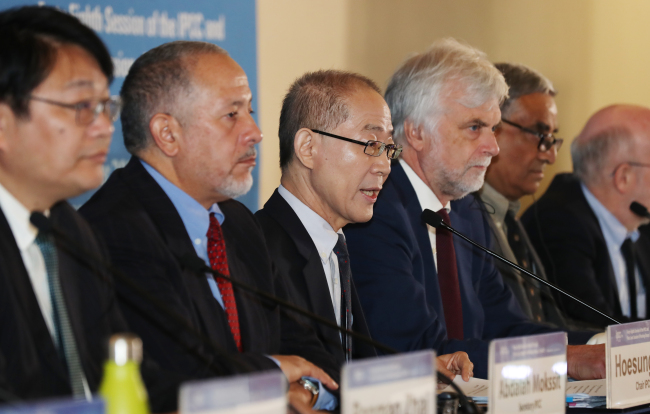‘World policymakers should limit global warming to 1.5 C’
IPCC warns of detrimental changes following rapid global warming
By Jo He-rimPublished : Oct. 8, 2018 - 17:53
INCHEON -- Governments and policymakers around the world should quickly take action to limit global warming to 1.5 degrees Celsius, as higher temperature increases of global warming may lead to far-reaching and unprecedented changes, the Intergovernmental Panel on Climate Change said in a new assessment Monday.
According to the Special Report on Global Warming of 1.5 degrees Celsius, global warming is likely to reach hit an increase of 1.5 degrees C between 2030 and 2052 if it continues at the current rate.
According to the Special Report on Global Warming of 1.5 degrees Celsius, global warming is likely to reach hit an increase of 1.5 degrees C between 2030 and 2052 if it continues at the current rate.

The report was approved on the last day of the 48th Session of the IPCC held in Songdo, Incheong, from Oct. 1 to Saturday. The report will provide key scientific input into the Katowice Climate Change Conference in Poland in December, when governments review the Paris Agreement to tackle climate change.
“With more than 6,000 scientific references cited and the dedicated contribution of thousands of experts and government reviewers worldwide, this important report testifies to the breadth and policy relevance of the IPCC,” said Lee Hoe-sung, the panel’s chairman.
The report highlighted a number of climate change impacts that could be avoided by limiting global warming to 1.5 degrees C rather than 2 degrees C. For instance, by 2100, the global sea level rise would be 10 centimeters less at the lower figure.
The report was made by the IPCC’s three working groups assessing the physical science basis of climate change, impacts, adaptation and vulnerability and the mitigation of climate change.
“Every extra bit of warming matters, especially since warming of 1.5 C or higher increases the risk associated with long-lasting or irreversible changes, such as the loss of some ecosystems,” said Hans-Otto Portner, co-chair of IPCC Working Group II.
According to the report, the likelihood of an Arctic Ocean free of sea ice in the summer would be once per century with global warming of 1.5 C, compared with at least once per decade at 2 C. Coral reefs would decline by 70-90 percent with global warming of 1.5 C, whereas virtually all would be lost at 2 C, the report said.
It is crucial, however, that “rapid and far-reaching” transitions are made in land, energy, industry, buildings, transport and cities, the report urged.
“Limiting warming to 1.5 C is possible within the laws of chemistry and physics, but doing so would require unprecedented changes,” said Jim Skea, co-chair of IPCC Working Group III.
Global Warming of 1.5 C is the first in a series of special reports to be produced in the IPCC’s Sixth Assessment Cycle. Ninety-one authors and review editors from 40 countries participated in the preparation of the IPCC report. The international panel said it will release a report next year that looks at how climate change affects land use titled Special Report on the Ocean and Cryosphere in a Changing Climate, and Climate Change and Land.
By Jo He-rimherim@heraldcorp.com">He-rim (herim@heraldcorp.com)











![[Today’s K-pop] BTS pop-up event to come to Seoul](http://res.heraldm.com/phpwas/restmb_idxmake.php?idx=644&simg=/content/image/2024/04/17/20240417050734_0.jpg&u=)





![[KH Explains] Hyundai's full hybrid edge to pay off amid slow transition to pure EVs](http://res.heraldm.com/phpwas/restmb_idxmake.php?idx=652&simg=/content/image/2024/04/18/20240418050645_0.jpg&u=20240418181020)

![[Today’s K-pop] Zico drops snippet of collaboration with Jennie](http://res.heraldm.com/phpwas/restmb_idxmake.php?idx=642&simg=/content/image/2024/04/18/20240418050702_0.jpg&u=)